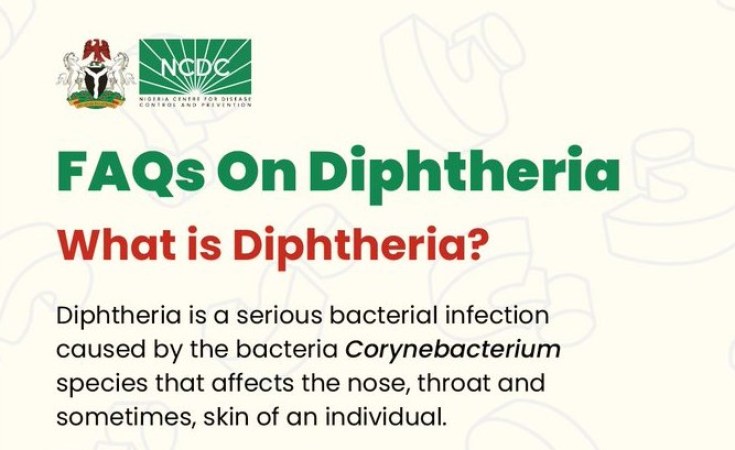Kano has the highest number of cases with 7,747, followed by Yobe with 841 cases.
The Nigeria Centre for Disease Control (NCDC) on Thursday said about 15,060 suspected cases of diphtheria infections have been recorded in the country as of 19 October.
Out of the suspected cases, 9,478 were confirmed from 137 local government areas (LGAs) across 20 states including the Federal Capital Territory.
The Director General of NCDC, Ifedayo Adetifa, while speaking at a press briefing in Abuja, said majority of the confirmed cases, (71.5 per cent) were aged between one to 14 years, with infants accounting for less than one per cent of the cases.
Mr Adetifa said data also shows that Kano, the epicentre of the infection has the highest number of cases at 7,747, followed by Yobe with 841 cases.
Breakdown of cases
Giving a further breakdown of the diphtheria cases, the NCDC boss said Bauchi State recorded 369 infections, followed by Katsina-275, Borno - 164, Jigawa -24, Kaduna-18, Lagos- eight, Zamfara- seven, FCT- seven, Gombe- five, Sokoto- four, Osun- three, and Niger State with two cases.
He said Cross River, Enugu, Imo, Nasarawa, Kebbi, Taraba recorded one case of diphtheria infection each.
Vaccination update
Speaking at the briefing, the Executive Director of the National Primary Health Care Development Agency (NPHCDA), Faisal Shuaib, said a total of 1,692,762 children, between six months and four years of age, have been diligently administered the Pentavalent vaccine--a vital safeguard against the disease.
Mr Shuaib said in addition, an impressive 3,166,419 children aged four to 14 years have received the Td vaccines, further strengthening the country from the disease among children and teenagers.
"The phase two, round one of our outbreak response using diphtheria vaccines commenced on 23 September and has unfolded in seven states, encompassing 56 LGAs that are profoundly impacted by the ongoing outbreak," he said.
He said the reach and impact of this concerted effort have been nothing short of remarkable.
Mr Shuaib said Kano State has exemplified its commitment to the cause, ensuring the immunisation of 1,111,310 children with Td vaccines and 544,737 children with Pentavalent vaccines in the phase two.
He said Katsina, another hotspot in this outbreak, has vaccinated 403,252 children with Td vaccines and 255,075 children with Pentavalent vaccines.
"Similarly, Kaduna, Bauchi, Borno, Jigawa, and Yobe have not faltered in their efforts either, collectively securing the health and well-being of hundreds of thousands of children through dedicated vaccination campaigns," he said.
Outbreak response
Mr Adetifa, the NCDC boss, said in response to the outbreak, the agency has deployed National Rapid Response Teams (NRRTs) to affected states, offering on-site surveillance and response support.
He, however, said security challenges have led to limited accessibility to some locations in the affected LGAs.
"The laboratory network has been instrumental in conducting preliminary and confirmatory testing at both sub-national and national levels," he said.
"Currently, there are 18 laboratories in the diphtheria laboratory network across 13 states, with ongoing optimisation efforts in Jigawa and Zamfara states."
He said the NCDC has also provided training and technical support to laboratory personnel across states.
He noted that the risk communication and community engagement have been prioritised in addressing the outbreak.
"NCDC has developed and disseminated public health advisories on diphtheria, as well as social behavioural change materials in collaboration with partners," he said.
"Regular media engagements, school engagements, and social listening on social media platforms are being utilised to raise awareness and address misinformation."
In his remarks, WHO country representative, Walter Mulombo, appreciated responders and health workers who have been working to treat patients, conduct surveillance, perform laboratory tests, and administer vaccinations.
Represented by UNICEF's Chief of Health, Edwardo Celades, he highlighted the incredible achievements that have been made in a short period, including the vaccination of millions of children.
"This success is attributed to the leadership of the NCDC, NPHCDA, and the Federal Ministry of Health, as well as the unwavering commitment of the frontline workers," he said.
He emphasised the collective commitment of all stakeholders to bring an end to the outbreak.
About Diphtheria
Diphtheria is a serious bacterial infection caused by the bacterium corynebacterium species that affects the nose, throat, and sometimes, the skin of an individual.
According to NCDC, people most at risk of contracting diphtheria are children and adults who have not received any or a single dose of the pentavalent vaccine (a diphtheria toxoid-containing vaccine), people who live in a crowded environment, in areas with poor sanitation, and healthcare workers who are exposed to suspected or confirmed cases of diphtheria.
NCDC also said the disease spreads easily among people through direct contact with infected people, droplets from coughing or sneezing, and contact with contaminated clothing and objects.
The symptoms of diphtheria include fever, runny nose, sore throat, cough, red eyes (conjunctivitis), and neck swelling. In severe cases, NCDC said that a thick grey or white patch appears on the tonsils and, or at the back of the throat associated with difficulty in breathing.


